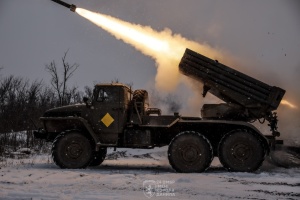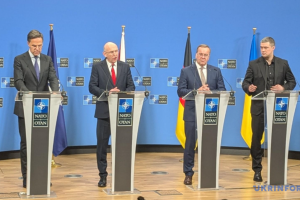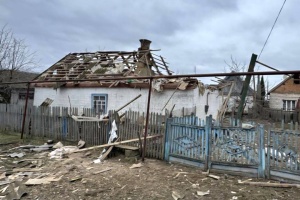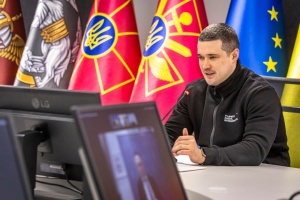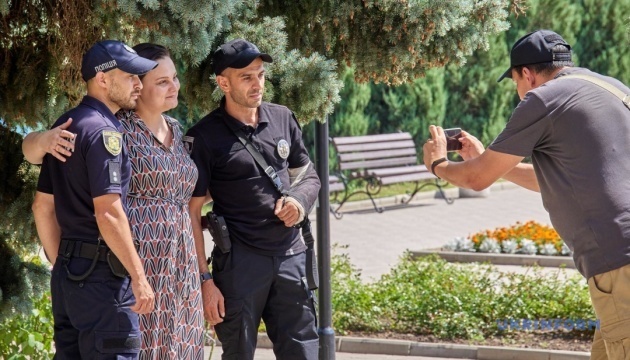
“They beat me every day. Chechens broke my arm as a parting gesture”
I met Izium police officers Emin Asadulaiev and Yakiv Palamarchuk by chance on Central Square, where they were posted on the day when diplomats from three countries visited the city. While waiting for the delegation’s final briefing, which was to take place here, we started talking. When I asked them how it felt to work in the liberated and completely destroyed city and whether it was scary, I did not know what these two law enforcement officers had been through. Next on Ukrinform are the stories of these courageous men.
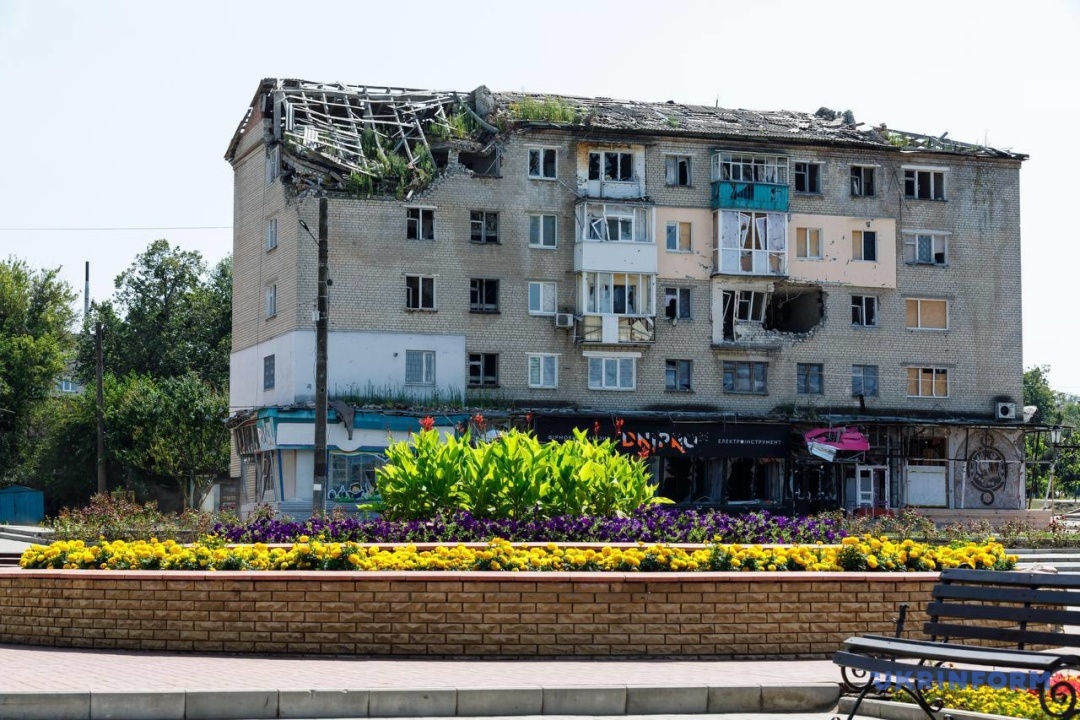
TWICE PRISONER AFTER THE CAPTURE OF THE CITY
Yakiv Palamarchuk was first taken out from the district police station by militants from the so-called DPR and LPR ― they put a bag over his head and took him to locations where the occupiers had already begun to quarter. There, the police officer saw other men, also with bags over their heads, being forced to their knees and severely beaten. This was what awaited him as well.
“They started beating me. Broke two ribs. I told them I didn’t know anything. They asked for my home address, then threw me into the trunk and drove to my apartment. In the house, they would provoke the neighbours by asking if I behaved OK as a police officer. The neighbours told them that I was a very good guy, quite adequate. They said, ‘We were told that he was a bad guy.’ They were looking for weapons at my apartment, but there was no point in looking for them after the house had come under mortar fire, and my apartment and the one next door caught fire and burned down,” says Yakiv. “After that, they took me and my girlfriend to her house, thinking that I might have hidden weapons there. They turned the whole house upside down. They planted the shoulder straps of a police colonel (laughs ― Ed.), I wonder where did they get them? Perhaps, they wanted to find a reason to pick on me. Then they took me behind the garage, beat me a bit, and took me to the district police station. Later, they took me to a kindergarten building, which I saw through a gap in the bag, and continued to torture me there. Some Russian soldier started pinching my arm and leg with pliers, twisting the skin. I had such big bruises. Another one came and punched me in the face ― my tooth fell out.”
Failing to obtain any information, the captors released the law enforcement officer. However, they would not leave him alone. As in other occupied territories, each new unit deployed on rotation would start interrogating people according to the same lists. Between May 2 and May 9, 2022, Yakiv was held captive by career Russian servicemen and kept in the basement of a garage behind the district police station.
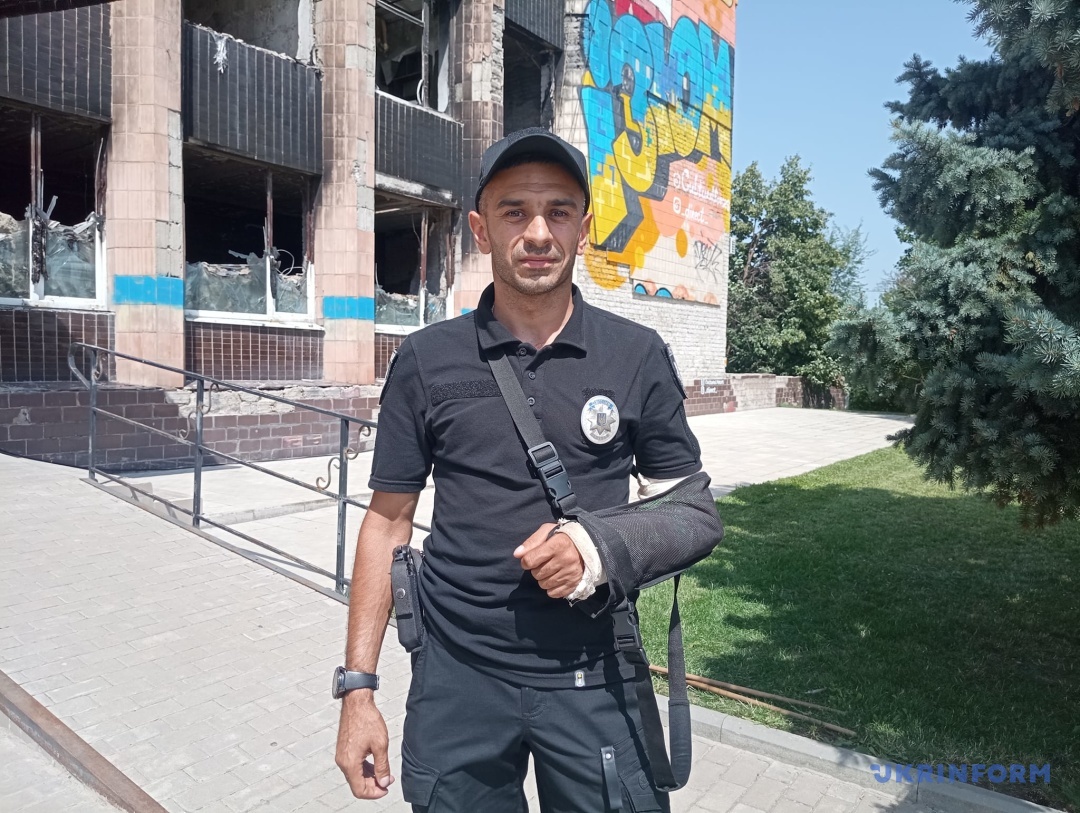
“It was a small room, very damp. There was a car seat. Some other people were there too, but I couldn’t see them, only heard them being tortured, their moans. I got beaten several times each day, and had no idea what time of day it was. On the seventh day, Akhmat flew in, and a Chechen would kick me, trying to hit me on the head, and although my hands were tied, I somehow managed to cover my head because I was bleeding so much. He stopped eventually,” the policeman recalls. “Eventually, they all couldn’t be bothered with me anymore, as they said. They offered me a job, because the city needed ‘police’ anyway. I didn’t want to provoke them, so I only told them that I wasn’t ready. They looked quite surprised ― how come, you will get a salary, we will find you a good position. I said I didn’t want to. So, I got me a broken arm as a parting gesture from them.”
As the limb was seriously injured, the policeman travelled to Kupiansk ― also occupied ― to get it treated. Unlike Izium, it had doctors and medicines.
“For better or worse, they had operated on it,” sighed the law enforcement officer.
Later, Yakiv noticed that Russian soldiers started following him. On May 30, the policeman made a deal with local guys who helped people escape for a fee, and was able to shake off the tail.
“Along with other people, I was taken to the destroyed Pecheniha Dam (called the ‘road of life’, it was the only way that the occupiers would allow residents of the occupied areas to enter Ukraine-controlled areas once a week in May and during the summer of 2022 ― Ed.). I arrived there at four in the morning. I asked Russians to let me through, but they shouted, no, we will shoot you, get lost. I said I wasn’t going anywhere. I lay down in the grass next to the checkpoint. Later, together with other people, I walked along the dam,” recalls Yakiv.
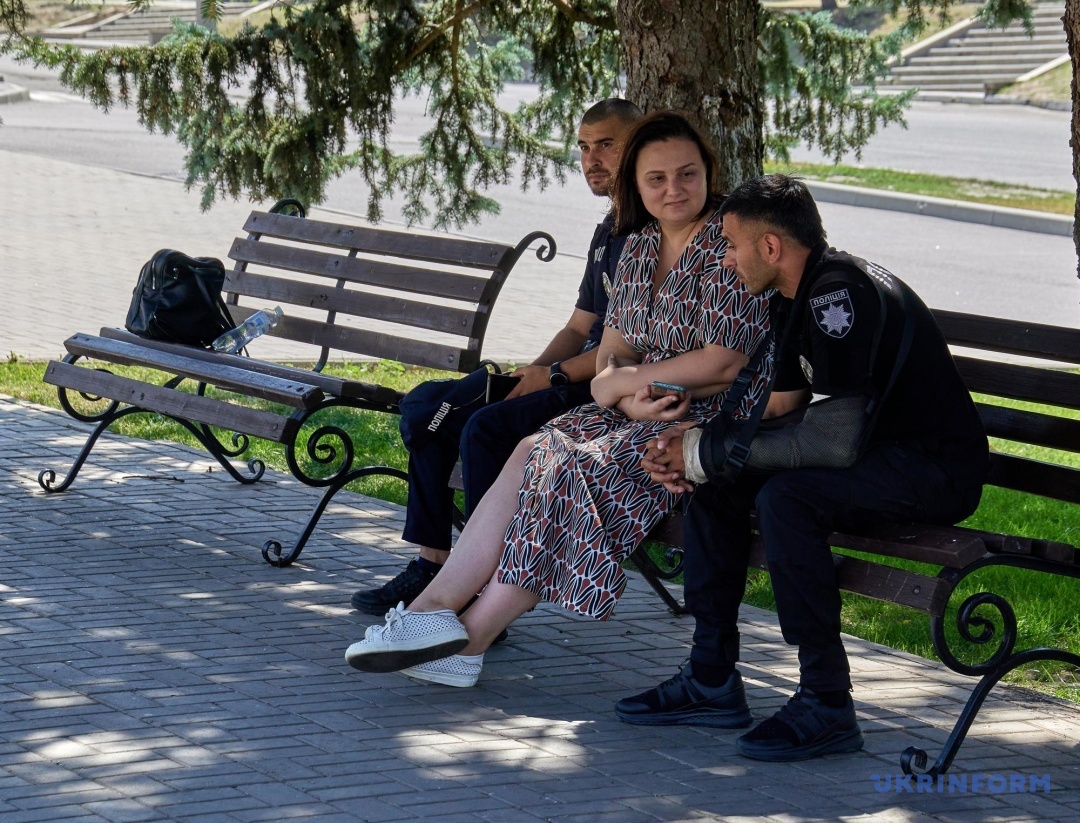
EVERYONE IN THE BOMB SHELTER KNEW WHO I WAS, BUT THEY DIDN’T GIVE ME UP
Police officers, dressed in civilian clothes, would still patrol the city until it was completely captured. Emin Asadulaiev recalls that corpses were just lying on the streets, remained in destroyed cars, with dogs gnawing at severed limbs. Residents would hide in bomb shelters and basements. “A few quite moments pass, we start a fire to cook something, and then the plane comes again. After the shelling subsides somewhat, people would start burying their neighbours right next to their homes, in their yards,” says the law enforcement officer. “From the other side of the Donets, Russians were shelling the city in addition to air strikes. Despite the imminent threat, residents would still venture out to get water from the wells (because all the utilities were damaged), to find firewood and food. When the first Russian convoy ― APCs and a tank ― arrived, my friends and I accidentally saw it and ran through the backyards to warn those territorial defense fighters who were at the police station. The guys only had automatic rifles, no walkie-talkies. They had to run for their lives. As far as I know, they were later ambushed, and only one of them survived.”
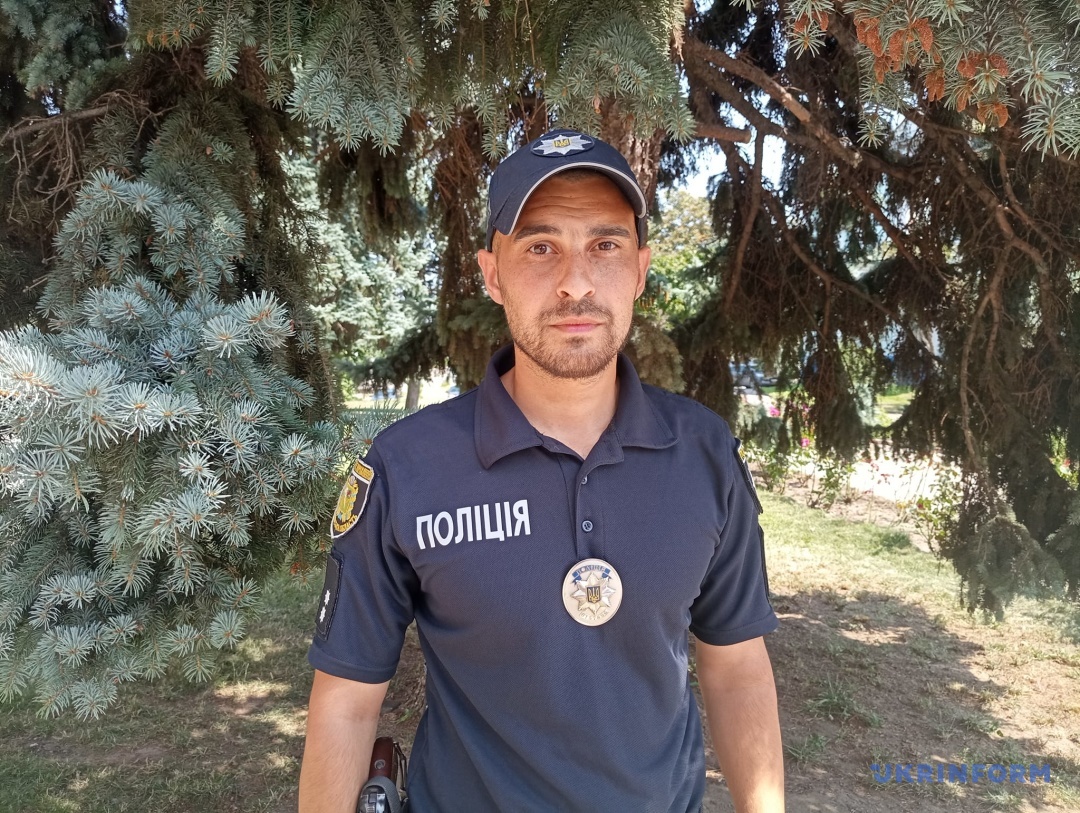
In the city, Russians would be looking for Ukrainian servicemen and law enforcement officers. Emin buried his gun and ID card.
“The occupiers were stunned, because the soldiers who defended Izium were actually not numerous. There were 20 small groups, but they would move around and fire at the Katsaps from various points. That’s how they created the actual impression of powerful forces being there. When the Russians came in, they started saying that they thought all the civilians had left. By that time, perhaps, 10 percent had left. And then they started, like, ‘Don’t worry, everything will get better soon, we will liberate you. You will live well.’ We lived so ‘well’ under them that had nothing to eat or drink,” says the law enforcement officer.
He recalls that they survived on home supplies until almost mid-April, when life became too hard.
“My wife was seven months pregnant, but her belly didn’t show. There was not enough food. I went to the hospital and asked if they would be able to deliver the baby at all (by that time, there were only one doctor ― a traumatic surgeon ― and a few other personnel remaining ― Ed.). They had no medicines, no painkillers. They said that in case something went wrong, they would not be able to help,” recounts Emin.
Moreover, each day the occupiers would check the kindergarten shelter where he was staying with his wife, looking for police officers.
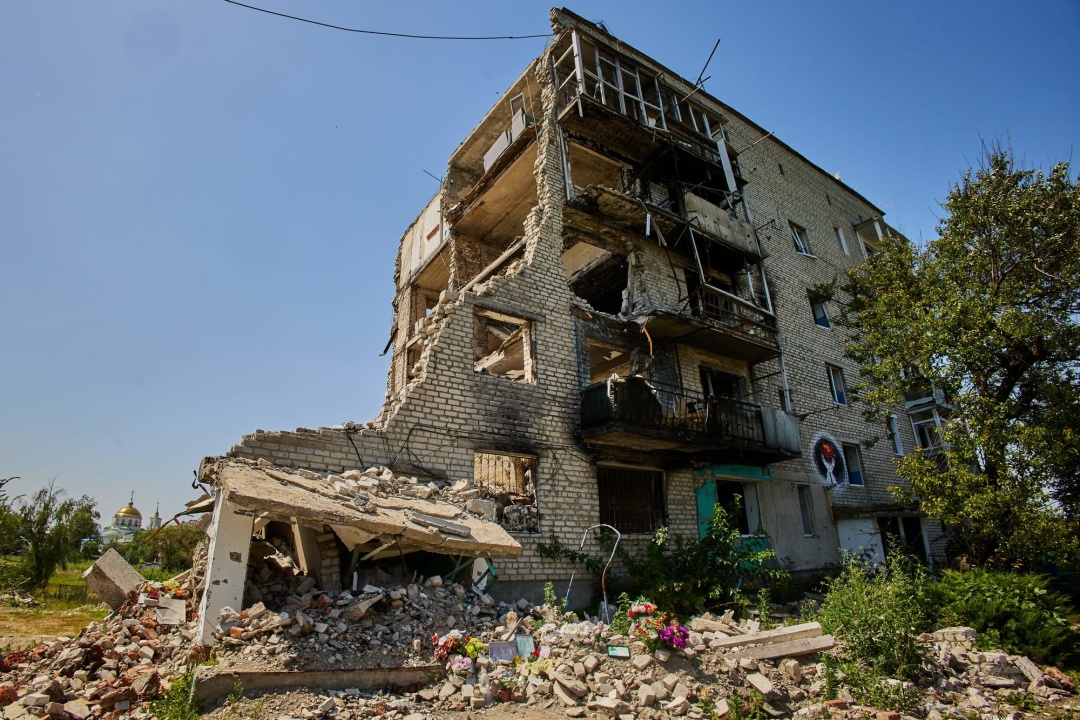
“I was lucky that people didn’t turn me in… Everyone knew who I was. I still wonder why they didn’t turn me in. You know, sometimes new people would come to the shelter in the middle of the night, just in their pyjamas and slippers. This would happen after each new terrible attack. They would shout that their house was gone, there was nowhere to hide. The director of the institution was no longer willing to let anybody in, saying that the shelter was overcrowded and that they should find some other place to go. I argued with her every time, saying that they should accept everyone, even if nothing but standing space remained. Maybe that’s why people hadn’t told the occupiers on me,” reflects Emin.
However, he was perfectly aware that very soon the invaders would identify him and that the lives of his wife and unborn child were also at risk. Together with two other law enforcement officers, he decided to escape the occupation.
“I took my wife, sister, nephews, parents, and grandmother. My colleagues also gathered their families together. One of them had to carry his father in a wheelchair. We realized that we might not make it, but we had to leave. We crossed the broken pedestrian bridge to reach the forest. At the checkpoints, they would stop us, examine our papers and let us go. But at the checkpoint close to Spivakivka, the occupiers became adamant, because an entire battery of howitzers, tanks, cannons was stationed there. We had elderly people and small children with us, so I told everyone to cry and beg. The invaders went to ask their commander for advice, came back and said that they would screen us carefully. We gave them all the gadgets we had ― phones, tablets, smartwatches, a laptop. They couldn’t find anything. I had my diploma on me, they saw that I was a graduate of the University of Internal Affairs. They said, ‘Oh, what a nice degree. Come and work for us.’ I told them, ‘No way, I did graduate, but I never worked, never wanted to, it’s just not my thing.’ Eventually, they took all our gadgets, although we persuaded them to give us back the SIM cards,” the policeman recalled.
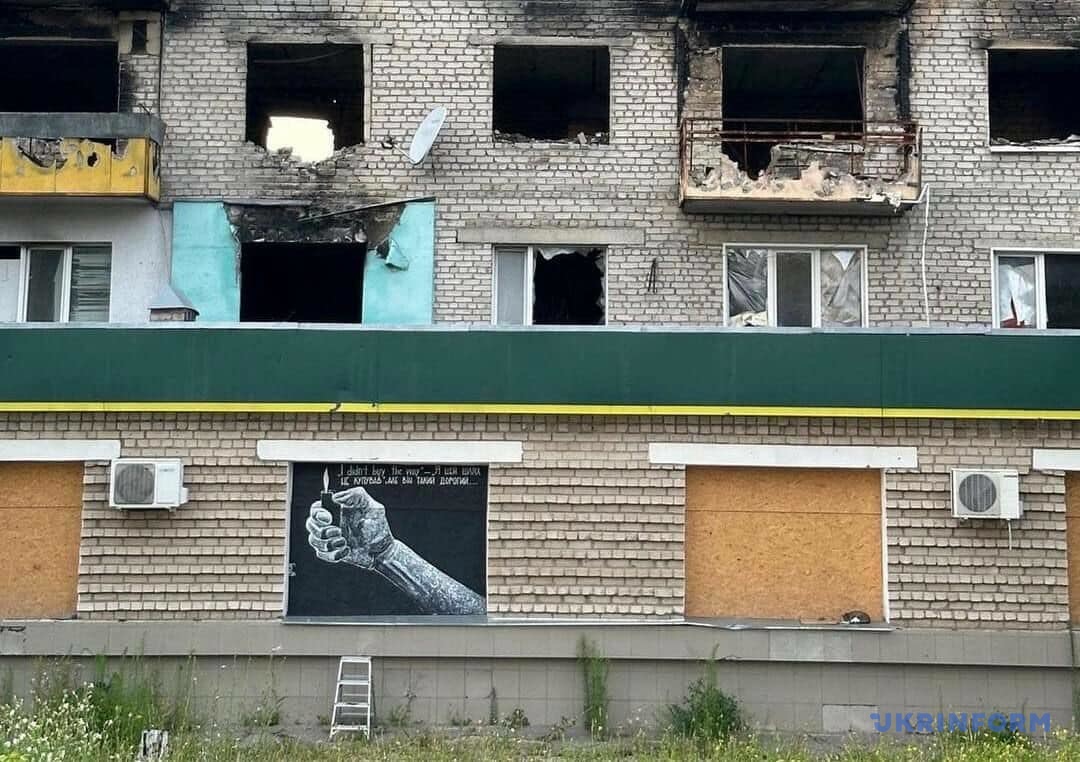
The whole group continued its journey. In Prydonetske, they met a man and a woman on the street who, seeing the children and the man in the wheelchair, called their friends. Volunteers came over to pick up the Izium refugees and take them to Spivakivka. They spent the night there. In total, the police officers had to lead their relatives for almost 20 kilometers on foot. A so-called quiet evacuation was underway at the village, conducted by volunteers without any official “green corridors” permitted by the occupiers, with Russian shelling regularly killing both the volunteers and the people they were trying to save. The law enforcement officers and their families were lucky to get to Dnipro.
“First, we went to Petrovske, across the suspension bridge, where there were buses waiting for us,” notes Emin.
SPECIAL SECURITY CHECKS AND A POLYGRAPH TEST
After everything that they had been through, the police officers wanted to come back to their work more than anything else, as they had to provide for their families. They underwent a thorough special check by the SSU and polygraph examiners, while testimonies of their activities and behavior during the occupation were being collected. Nothing wrong was found either with Emin and Yakiv who still has to wear his arm in a sling. On the Facebook page of the Izium police, grateful comments can be seen under the posts with the law enforcement officer’s photo ― people are glad to see him back on duty and recall his help to the townspeople in March-April 2022.
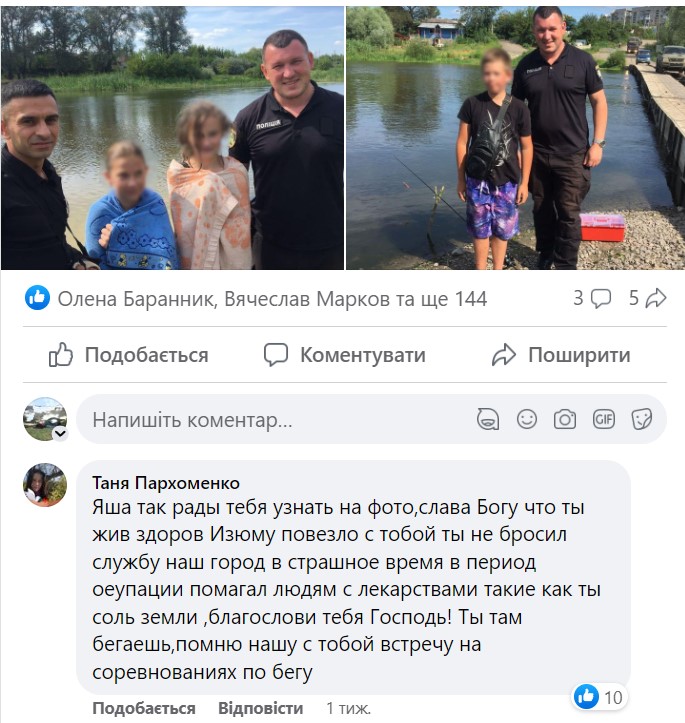
Both police officers are firmly convinced that they belong in their native Izium.
“My apartment was destroyed. I live in my mother’s house (my mother passed away last fall) which is also damaged and has no windows. But I’ve hammered a few nails here and here, glued a few things together, and I’m in no hurry to fix it because the situation is still touch and go. It’s a pity that people have gotten used to such living conditions, there are many broken houses… But I’m not leaving the city. I was born and grew up here, and came back to work here after graduating from the university,” concludes Yakov.
I also ask Emin how his wife and child are doing.
“Everything ended well, I have a son,” the policeman smiles.
Guys, thank you for your loyalty to the oath and your daily service!
Yuliia Bairachna, Kharkiv ― Izyum
Photos by the author and Serhii Kozlov

